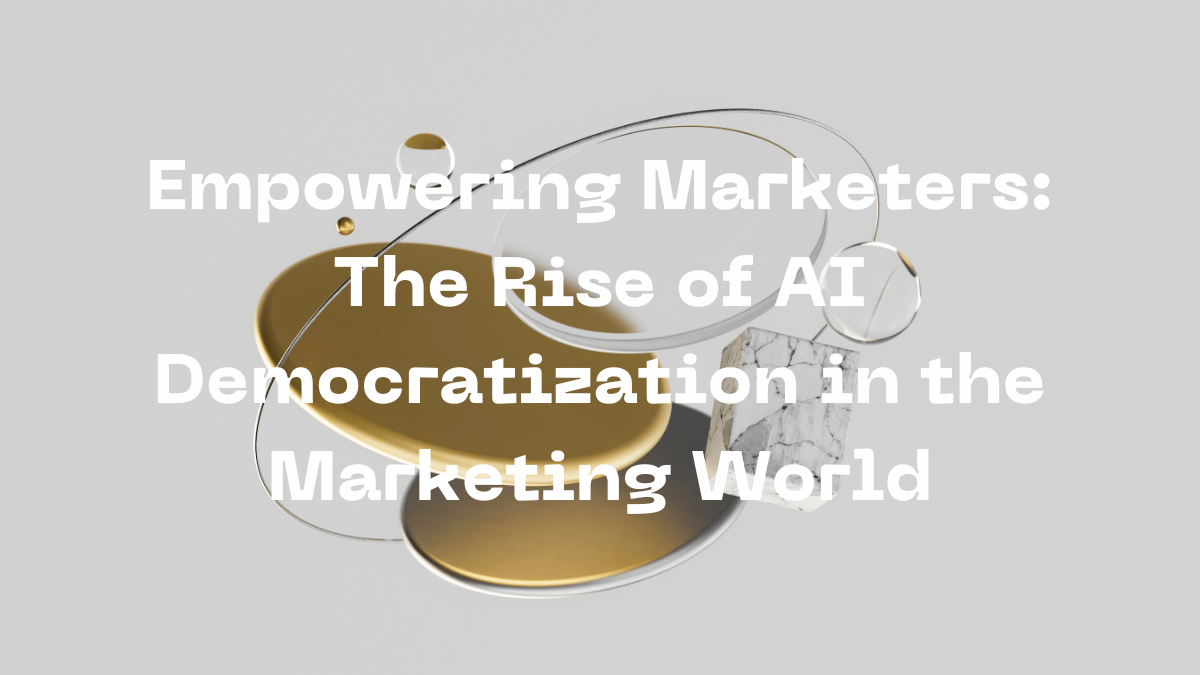
Artificial Intelligence (AI) has revolutionized various industries, and marketing is no exception. In recent years, there has been a significant rise in AI democratization, making it accessible to marketers of all sizes. This article explores the benefits of AI democratization for small businesses and how it addresses the long-tail problem in marketing. We will also delve into the role of custom-built projects and AI development platforms, the shift from code-based to data-based AI development, and the ability of AI to spot patterns and provide valuable insights in marketing. Join me as we uncover the power of AI democratization and how it is empowering marketers.
The benefits of AI democratization for small businesses
Traditionally, AI has been perceived as a technology exclusive to large corporations due to its complexity and high costs. However, with the democratization of AI, small businesses can now leverage its power to gain a competitive edge. One of the key advantages of AI democratization is its affordability. Thanks to advancements in technology and the availability of AI development platforms, small businesses can access AI tools and solutions without breaking the bank.
Another benefit of AI democratization is the ability to level the playing field. Small businesses often face resource constraints, making it challenging to compete with larger companies. However, AI democratization allows small businesses to harness the same cutting-edge technologies as their bigger counterparts. Whether it’s optimizing marketing campaigns, personalizing customer experiences, or automating repetitive tasks, AI provides small businesses with invaluable tools to enhance their marketing efforts.
Understanding the long-tail problem in marketing
The long-tail problem refers to the challenge of effectively reaching and engaging with niche target audiences. In traditional marketing, the focus is often on the “head” of the market, which consists of popular products or services with mass appeal. However, there is a vast untapped potential in the “tail” of the market, where niche offerings cater to specific customer needs. AI democratization plays a crucial role in addressing the long-tail problem by enabling marketers to analyze vast amounts of data and identify profitable niche segments.
By leveraging AI-powered tools, marketers can uncover hidden patterns and gain insights into customer behavior within these niche markets. This allows for more targeted marketing strategies and personalized experiences, leading to higher customer satisfaction and increased sales. With AI democratization, marketers can tap into the long-tail market and unlock its full potential, reaching customers who were previously overlooked.
Custom-built projects and AI development platforms
AI democratization is not limited to using pre-existing AI tools. It also empowers marketers to create custom-built projects tailored to their specific needs. With the availability of AI development platforms, marketers can design and develop AI solutions without the need for extensive coding knowledge. These platforms provide a user-friendly interface, allowing marketers to define their objectives, input data, and train AI models to achieve desired outcomes.
Custom-built projects offer a higher degree of flexibility and control, enabling marketers to address unique challenges and seize opportunities specific to their industry or target audience. Whether it’s developing chatbots for customer support, predictive analytics for sales forecasting, or image recognition for visual branding, AI development platforms empower marketers to create innovative solutions that align with their marketing strategies.
The shift from code-based to data-based AI development
Traditionally, AI development required a deep understanding of coding and algorithms. However, with the rise of AI democratization, there has been a shift from code-based to data-based AI development. This shift is driven by the realization that the quality and quantity of data play a significant role in AI performance.
Data-driven AI development focuses on training AI models using vast amounts of relevant data. By feeding AI algorithms with diverse and high-quality data, marketers can enhance the accuracy and efficiency of AI-powered applications. This approach allows marketers to uncover meaningful patterns, identify trends, and make data-driven decisions that drive marketing success.
Spotting patterns and insights with AI in marketing
One of the most significant contributions of AI democratization in marketing is its ability to spot patterns and provide valuable insights. AI-powered algorithms can analyze large volumes of data in real-time, identifying patterns that humans might overlook or take a significant amount of time to discover. This capability enables marketers to make data-driven decisions and optimize their marketing strategies for maximum impact.
For example, AI can analyze customer browsing behavior, purchase history, and demographics to identify patterns that indicate potential upsell or cross-sell opportunities. Additionally, AI can help marketers uncover trends in social media conversations, enabling them to tailor their messaging and content to resonate with their target audience. By leveraging AI to spot patterns and gain insights, marketers can stay ahead of the competition and deliver highly targeted and impactful marketing campaigns.
The role of AI in empowering marketers
AI democratization is empowering marketers in numerous ways. Firstly, it enables marketers to make data-driven decisions by providing insights and patterns that drive marketing strategies. By automating repetitive tasks, AI frees up valuable time for marketers to focus on high-level strategy and creativity. Additionally, AI helps marketers personalize customer experiences, leading to higher engagement and customer loyalty. With AI democratization, marketers have access to powerful tools that enhance their capabilities and empower them to achieve marketing success like never before.
Challenges and considerations in AI democratization
While AI democratization offers immense opportunities, it also comes with its fair share of challenges and considerations. One of the primary concerns is data privacy and security. With the increased reliance on AI, marketers must ensure that customer data is protected and used ethically. It is crucial to adhere to data protection regulations and implement robust security measures to safeguard sensitive information.
Another challenge is the need for continuous learning and upskilling. As AI technology evolves rapidly, marketers must keep up with the latest advancements and acquire the necessary skills to leverage AI effectively. This may require investing in training programs or hiring AI specialists to ensure optimal utilization of AI tools and platforms.
Conclusion: Embracing AI democratization in the marketing world
AI democratization is revolutionizing the marketing world by empowering marketers of all sizes. Small businesses can now access affordable AI tools and solutions, leveling the playing field and driving their marketing success. With the ability to spot patterns and gain valuable insights, marketers can make data-driven decisions that enhance their marketing strategies. The shift from code-based to data-based AI development allows marketers to leverage the power of AI without extensive coding knowledge. By embracing AI democratization, marketers can overcome the challenges of the long-tail problem and reach niche markets with targeted and personalized marketing efforts. It’s time for marketers to embrace AI democratization and unlock its full potential in the marketing world.






